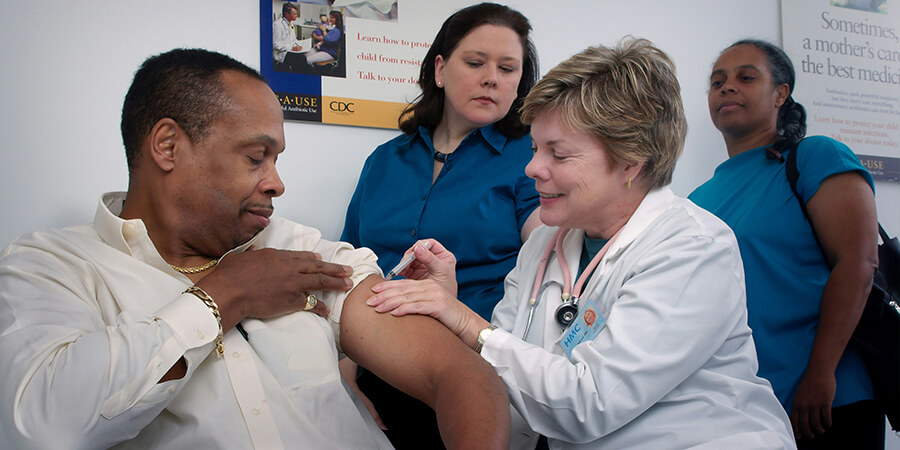From Compassion to Communication:
6 Soft Skills Healthcare Workers Need to Succeed
See also: Compassion
Hard skills - or ‘technical’ skills - are a must in the healthcare industry. On the clinical side of medicine, hard skills such as administering medication or IV drips directly impact patient care. On the administrative side, healthcare managers need technical skills related to operational, resource, and financial duties to manage a healthcare facility effectively.
What is often underestimated however is the need for soft skills. Soft skills are the skills needed to handle interactions among people or skills that relate to how one behaves or approaches certain tasks within the job.
The COVID-19 pandemic has led to alterations in the mental health of the population and behavioral changes that include significant deficits in the acquisition of soft skills. As a result, both the health and educational sectors have been challenged. These types of task-management, people, and leadership skills in nursing and other similar professions are essential for the healthcare sector, particularly when considering the importance of the relationship between healthcare professionals and their patients and families. To counter this decline in soft skills, authorities are making efforts to implement programs that develop and improve these skills, and it is anticipated these competencies will become a part of the schooling syllabus in the future.
In the meantime, we have listed six soft skills healthcare workers need to succeed.

1. Communication Skills
Having exceptional communication skills is an important trait across multiple work sectors, but for healthcare workers it is essential.
Almost all healthcare workers are required to speak with patients and their families about significant and sometimes difficult health issues in a clear and understandable manner — some professionals do this every day. They also must communicate effectively with their coworkers to manage proper care handover.
According to a study in the Journal of Ambulatory Care Management patients’ perception of the quality of care they received is dependent on the quality of the interactions they had with their healthcare professionals, suggesting good communication skills play a key role in effective patient care and satisfaction.

Healthcare professional’s communication skills are important particularly when it comes to patient care.
2. Empathy
The ability to empathize with a patient is another people-related soft skill important in healthcare. Healthcare workers look after people experiencing everything from a bad day or annoying issue, to some of the worst times of their lives, and to do this appropriately is to approach it with empathy.
Anxiety while dealing with illness or injury is common and can be extremely debilitating for those experiencing it. To be able to empathize and show understanding towards a patient going through a difficult situation can help provide effective emotional support and facilitate more caring treatment.
Demonstrating empathy can also help build a stronger relationship between the patient and the healthcare professional, enabling a smoother treatment process as the patient trusts the professional, which is incredibly important to any treatment plan.
3. Work Ethic
Work ethics is a personal set of values that determines how someone approaches their work. People with strong work ethics are generally motivated and produce high-quality results - or in healthcare, high-quality care.
In healthcare, ethics that guide professional behavior may include integrity, responsibility, quality, and teamwork. Good work ethics foster employee satisfaction, can enhance the individuals' or facility's reputation, and contribute to organizational achievements.
4. Stress Management
Even at the best of times, healthcare is a stressful sector to be working in. The pressure of literally saving lives can often lead to stress and burn-out, and a Frontiers in Public Health report estimated approximately 48% of nurses surveyed had experienced occupational stress. The most stressful factors reported were dealing with death and dying, uncertainty around treatment, and conflicts with physicians. Unfortunately, while these factors continue to be realities of the industry, nurses and other healthcare workers need to deal with them, so stress management is incredibly important.
To provide quality healthcare and remain focused, healthcare professionals must know how to handle the intense pressure of the job. Implementing stress management strategies and having open communication between employees and their leaders are important ways to manage this successfully, but everyone will have different techniques that work for them and their personal situation.
5. Positive Attitude
The harsh realities of healthcare combined with its stressful environment have the potential to wear a person down over time. This can lead to stress and other negative impacts on one’s life, so it is important, where possible, to maintain a positive attitude. This one goes hand in hand with stress management, but it’s slightly different as a positive attitude is an important focus even in times where stress increases and you might be unable to destress in the ways you usually do.
It’s easier said than done, of course. But maintaining a positive mindset can help enormously when dealing with the difficulties of the healthcare sector and help reduce the likelihood of experiencing stress or burnout. Maintaining a healthy work-life balance is an excellent way to keep a positive attitude, as it ensures that work-related stress or negativity doesn’t begin to overrule other parts of your life.
6. Time Management
The final soft skill on our list is time management. Managing your time effectively is important in any career, but of course, once again, it is especially vital in healthcare where poor time management has the potential to put lives at risk. Even in situations that aren’t this dire, it’s no secret that healthcare workers are incredibly busy, and often juggling multiple tasks, projects, or patients at once, so time management is crucial to a successful day — and a successful career.
Working in healthcare, you will often be pulled in multiple directions simultaneously, managing multiple patients and other administrative tasks. Being able to prioritize these duties and triage pressing matters will not only make for an easier work day but will also likely result in better health care for patients and a more successful career for the healthcare professional.

Time management is an important soft skill in healthcare.
Mastering these soft skills benefits not only the healthcare professional but also their coworkers, patients, and their families. In continuously and actively working on these soft skills, healthcare professionals will create an environment where the best outcomes are achieved for all.
About the Author
Michelle Buljan is a Melbourne-based writer and student at RMIT. She's mad for all things marketing with a love for creative campaigns that entertain and leave a lasting impression. Michelle’s interest in psychology allows her to specialize in campaigns and content she designs for the target audience with subtlety and empathy. Her interests include music, the arts, culture, psychology, and the complex web of interpersonal connections humans create with each other.
